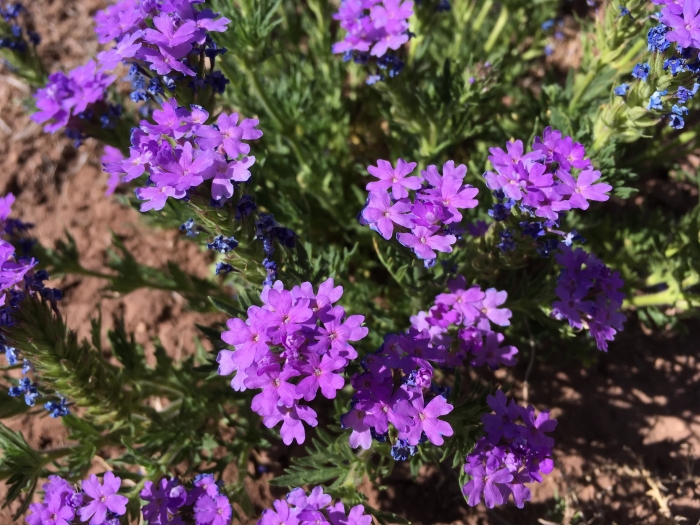Davis Mountain Mock Vervain
(Glandularia bipinnatifida var. ciliata)
Davis Mountain Mock Vervain (Glandularia bipinnatifida var. ciliata)
/
/

Cecelia Alexander
Public Domain
Image By:
Cecelia Alexander
Recorded By:
Copyright:
Public Domain
Copyright Notice:
Photo by: Cecelia Alexander | License Type: Public Domain | License URL: http://creativecommons.org/publicdomain/zero/1.0/ | Rights Holder: Cecelia Alexander | Publisher: iNaturalist | Date Created: 2018-05-13T15:33:22Z |






















































Estimated Native Range
Summary
Glandularia bipinnatifida var. ciliata, commonly known as Davis Mountain Mock Vervain, is a perennial herb that may behave as an annual in some climates. It is native to open woodlands, grasslands, and desert scrub in the Southwestern United States and Mexico. This plant typically reaches a height of 0.4-0.7 feet (0.1-0.2 meters) and spreads 0.7-1 feet (0.2-0.3 meters), forming a low, mounding clump. The leaves are deeply lobed, lending a fine-textured appearance. Davis Mountain Mock Vervain produces clusters of vibrant pink flowers that bloom profusely in the spring and summer, attracting pollinators such as butterflies and hummingbirds.
The plant is valued for its drought tolerance and long blooming period, making it an excellent choice for xeriscaping, rock gardens, and border fronts. It is also used in wildflower meadows where its low water needs and ability to thrive in poor soils are advantageous. Davis Mountain Mock Vervain prefers full sun exposure and is adaptable to a range of soil types, provided they have good drainage. While it is generally low-maintenance, it can be susceptible to root rot if overwatered. Deadheading spent flowers can encourage a longer blooming season.CC BY-SA 4.0
The plant is valued for its drought tolerance and long blooming period, making it an excellent choice for xeriscaping, rock gardens, and border fronts. It is also used in wildflower meadows where its low water needs and ability to thrive in poor soils are advantageous. Davis Mountain Mock Vervain prefers full sun exposure and is adaptable to a range of soil types, provided they have good drainage. While it is generally low-maintenance, it can be susceptible to root rot if overwatered. Deadheading spent flowers can encourage a longer blooming season.CC BY-SA 4.0
Plant Description
- Plant Type: Herb
- Height: 0.4-0.7 feet
- Width: 0.7-1 feet
- Growth Rate: Moderate
- Flower Color: Pink, Purple
- Flowering Season: Spring, Summer
- Leaf Retention: Evergreen
Growth Requirements
- Sun: Full Sun
- Water: Low
- Drainage: Medium, Fast
Common Uses
Bee Garden, Bird Garden, Butterfly Garden, Deer Resistant, Groundcover, Hummingbird Garden, Low Maintenance, Showy Flowers, Street Planting
Natural Habitat
native to open woodlands, grasslands, and desert scrub in the Southwestern United States and Mexico
Other Names
Common Names:
Scientific Names: , Glandularia bipinnatifida var. ciliata, Glandularia wrightii, Verbena wrightii, Verbena ciliata, Glandularia pubera, Verbena ambrosifolia, Verbena gooddingii var. nepetifolia, Glandularia bipinnatifida var. brevispicata, Verbena ciliata var. pubera
GBIF Accepted Name: Verbena bipinnatifida var. nepetifolia (Tidestr.) Jeps.